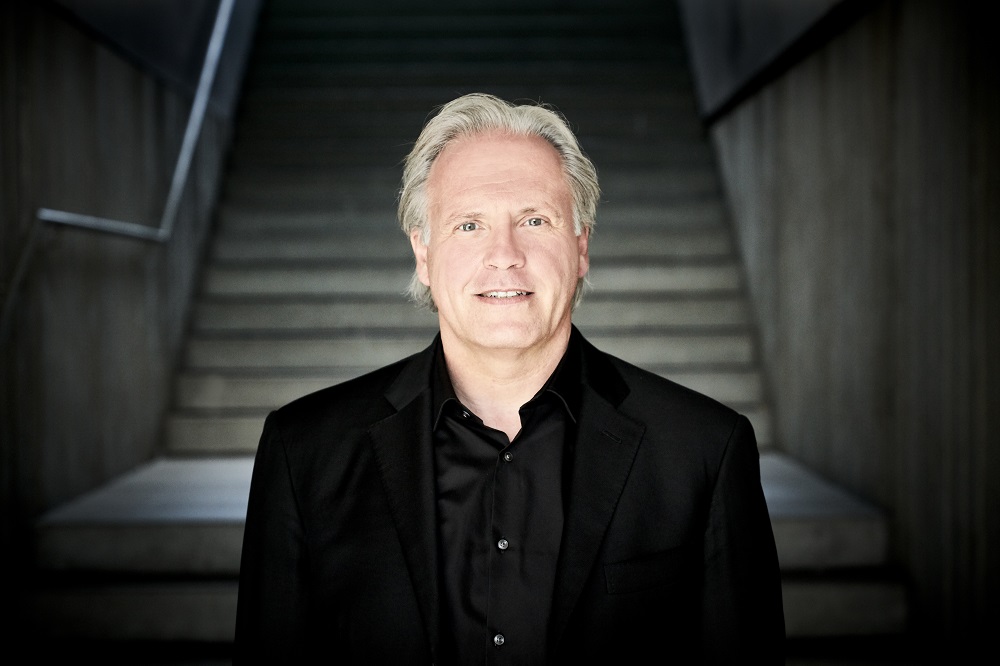
James Ehnes (violin, above), City of Birmingham Symphony Orchestra / Markus Stenz (below)
Schumann Violin Concerto in D minor WoO23 (1853)
Bruckner Symphony no.7 in E major WAB107 (1881-83, ed. Nowak)
Symphony Hall, Birmingham
Thursday 25 April 2024
Reviewed by Richard Whitehouse Picture of James Ehnes (c) Benjamin Ealovega, Markus Stenz (c) Kaupo Kikkas
His appearance here for performances of Mahler’s Second Symphony two years ago had made one hope that Markus Stenz might soon be invited back to the City of Birmingham Symphony Orchestra – such being so tonight for this outstanding programme of Schumann and Bruckner.
Although it now enjoys frequent hearing, Schumann’s Violin Concerto yet remains under the shadow of its eight-decade limbo after the composer’s mental breakdown then decision by its intended soloist Joseph Joachim to withhold performance. Only in 1937 was it given in public, since when it has gradually come to be regarded (as Yehudi Menuhin believed it would be) as the missing link between Beethoven and Brahms. Certainly, there was nothing tentative about James Ehnes’ advocacy, which proved as interpretively acute as it was technically immaculate.
Pacing the initial movement so that its earnest character never becomes unduly sombre is not easy, but Ehnes ensured its halting progress never felt effortful and Stenz drew textures of no mean luminosity from these modest forces. The slow movement seemed more eloquent for its listless pathos, with its terse transition into the finale astutely judged. Its underlying polonaise rhythm deftly inflected, this rather gauche rondo yielded an easy-going momentum in the call and response between soloist and orchestra, through to a conclusion both genial and resolute.
A memorable performance which reinforced Ehnes as among the most consistent (as well as undemonstrative) of present-day virtuosi – something that was no less evident in his account of the Third Sonata (‘Ballade’) by Eugène Ysaÿe which here made for a scintillating encore.

The UK has seen little of Stenz since his tenure with the London Sinfonietta during the mid-1990s, a pity given he has few peers among conductors of his generation in terms of Austro-German repertoire. Such was borne out by Bruckner’s Seventh Symphony – Classical in its lucidity of motion, Romantic in its frequently impulsive emotion. Not least an initial Allegro moderato that elided between its contrasting themes with unforced rightness, the abruptness of certain tempo changes (accentuated by his rare recourse these days to the Nowak edition) channelled into a coda of surging sublimity. Even finer was the Adagio for the inevitability with which this drew respectively elegiac and lyrical themes into a sustained traversal, via an exultant peroration (cymbal and triangle duly outdone by timpani), to a nobly resigned close.
The latter two movements can easily seem anti-climactic, but there was nothing understated about the Scherzo as Stenz heard this – the impetus and acerbity of its outer sections finding accord with a trio whose lilting poise was delectably pointed. As for the Finale, most succinct of Bruckner’s maturity, Stenz emphasized its expressive contrast between themes through his choice of tempi – while managing to mould these into a convincing unity before heading into a coda which revisits that of the first movement with blazing affirmation in the here and now.
The performance would not have made the impact it did without the CBSO playing at or near its best throughout – such Bruckner interpretation having few, if any, equals when it comes to live music-making. One can only hope conductor and orchestra will work together again soon.
Click on the link to read more on the current CBSO concert season, and on the names for more on violinist James Ehnes and conductor Markus Stenz
Published post no.2,161 – Saturday 26 April 2024



